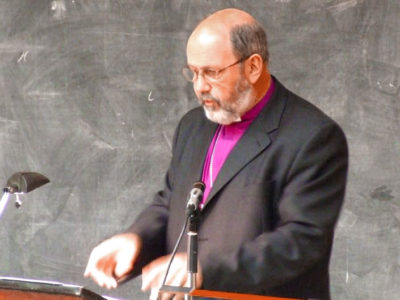I GOT AN EMAIL ALERT this week from the Religion News Service:
“One of the most formidable figures in the world of Christian thought weighs in on hot topics such as natural disasters, homosexuality, and whether he thinks Christians can believe in Darwinian evolution.”
The “formidable figure” is N.T. Wright, plugging his new book: Surprised by Scripture: Engaging Contemporary Issues.
N.T. Wright is a big name in Bible study. So I wanted to know what he thought about those topics.
I should have known better.
I have the quote branded into my memory. It’s something a top scholar in my theological circle told me one day:
“You can say anything, if you say it carefully.”
We were talking about intellectual honesty, and how tough it can be for Bible scholars to say what they believe when what they believe doesn’t agree with what their church pays them to teach.
I can give you names of scholars who got called to appear before the church Top Dogs to defend something they said in class that some student—possibly the son of a district superintendent—didn’t like.
This is like getting audited. No one wants that.
So scholars have learned to be careful what they say in public.
I once sat in on a lecture about biology, taught by a scientist in a conservative denomination. In the Q&A, I asked him about evolution and if he could give me examples of evolutionary changes that have been documented.
He told me to see him after class.
Then he gave me the examples that he didn’t seem to feel comfortable talking about in a room full of witnesses.
OK, I’m going to get back to N.T. Wright, but first let me translate the quote from the scholar who said he can say anything if he says it carefully. Here’s my translation:
“If you believe something controversial and have to talk about it, don’t say anything that makes sense.”
Now to N.T. Wright.
Here’s the question that interviewer Jonathan Merritt served him up:
“Would your approach to the Bible allow, for example, the blessing of monogamous, lifelong same-sex relationships?”
For the record, that’s a yes or no question.
See if N.T. Wright answers yes or no.
I’m going to give you his entire answer, which is wordy. But I think it will help you see how someone like me could make a living translating Bible scholars for folks today.
Monogamous, lifelong same-sex relationships were known in the ancient world as well as in the modern—there is plenty of evidence, despite what people sometimes say. When Jesus reaffirms the traditional Jewish standards of sexual behavior (he was talking in a Jews-only context where people would know what his shorthand sayings meant), and when Paul, speaking in a largely Gentile context, spells out a bit more clearly what is and what isn’t part of the new-creation lifestyle for those “in Christ,” this way of life was always counter-intuitive in that world, as it is again today.
But it’s important that we do not reduce the Bible to a collection of true doctrines and right ethics. There are plenty of true doctrines and right ethics there, of course, but they come within the larger thing, which is the story of how the Creator is rescuing and restoring the whole creation, with his rescue and restoration of humans at the heart of it. In other words, it isn’t about “do we allow this or that?” To ask the question that way is already to admit defeat, to think in terms of behavior as a set of quasi-arbitrary, and hence negotiable, rules.
We must ask, with Paul, “This new creation God has launched in Jesus—what does it look like, and how can we live well as genuine humans, as both a sign and a means of that renewal?” We need to remind ourselves that the entire biblical sexual ethic is deeply counter-intuitive. All human beings some of the time, and some human beings most of the time, have deep heartfelt longings for kinds of sexual intimacy or gratification (multiple partners, pornography, whatever) which do not reflect the creator’s best intentions for his human creatures, intentions through which new wisdom and flourishing will come to birth. Sexual restraint is mandatory for all, difficult for most, extremely challenging for some. God is gracious and merciful but this never means “so his creational standards don’t really matter after all.
So, was N.T. Wright’s answer to the question yes or no?
Now I imagine you’d like me to translate his response for you, right?
If you go to the website where this interview was posted, and you read the comments there, you’ll see that some readers say Wright was defending the traditional view that couples need to be guy/gal. Not gal/gal or guy/guy. And you’ll see that other readers see Wright pointing in a new direction, away from questions about “do we allow this or that?”
When scholars split the crowd like that, they smile. Job done. Skin saved and…bonus…students are thinking and talking.
The scholar has said what he wanted to say by not saying what someone else wanted to hear—and he said it obliquely, but with authority.
Here’s my translation of how N.T. Wright answered the question, though I would never put this in a book because it’s merely my best guess:
“You are not ready to hear what I have to say about this, and I am not ready to tell you.”
It’s Friday. Are we having fun yet?



He’s got marketing skills…. Lawyers would love him.
Steve…I couldn’t pass this up….let me say that this is a very difficult subject. Let me recommend this website of Rev. Justin R. Cannon to those who would like to see good scholarship on the “clobber passages.” You may download his free book: “The Bible, Christianity, and Homosexuality” in .pdf format.
http://www.inclusiveorthodoxy.org/